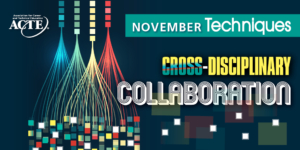Raise the Bar: Unlocking Career Success is an initiative that reimagines how our nation’s high schools prepare all students to thrive in their future careers. It blurs the lines between high school, college and career, providing students with accelerated and innovative opportunities to earn college credits and gain real-world career experience.
This joint effort — across the U.S. Departments of Education, Labor, and Commerce — supports public and private sector leaders, government agencies and other community-based organizations to help students earn postsecondary degrees and industry credentials that our employers need and our economy demands.
Key strategies to unlock career success
- Dual enrollment
- Work-based learning
- Workforce credentials
- Career advising and navigation
Under Perkins V, the Department of Education’s Office of Career, Technical and Adult Education administers the Native
American Career and Technical Education Program (NACTEP), the Native Hawaiian Career and Technical Education Program
(NHCTEP), and the Tribally Controlled Postsecondary Career and Technical Institutions Program (TCPCTIP). These three
statutory discretionary grants support delivery of high-quality career and technical education (CTE) programs with respect to Native culture.
Dual enrollment
Chief Leschi Schools, a tribal school in the Puyallup Valley in Washington, supports dual enrollment in several CTE programs, such as culinary arts, education, technology and health care. Admin have implemented a successful practice to centrally manage dual enrollment across the region. The initiative was created and is maintained by local CTE directors.
Through dual enrollment, Castle High School students can earn industry credentials and college credit toward a medical specialty. Castle High School (a subrecipient of ALU LIKE Inc., a nonprofit in Hawaii) established an early college partnership with Windward Community College (WCC) to ensure that dual enrollment credits earned in high school are aligned to college majors.
Work-based learning
In California, the Blue Lake Rancheria tribe offers paid work-based learning experiences with the option of student-designed or business-designed opportunities. Mentors emphasize employer expectations and provide job coaching. In addition to hands-on experiences with community mentors, students have access to Native student clubs, dual enrollment and industry certifications.
The Coeur d’Alene Tribe, in Idaho, hosted an Indigenous Summer Youth Internship Program that provided participants a
thorough history of the tribe. The summer program offered learning tracks in climate exploration, advanced art and animation, photography, medicinal plants, and storytelling and animation. The program empowers students to pursue college enrollment and to design a career continuing the work of restoring lands, water and people.
Workforce credentials
Navajo Technical University, in New Mexico, trains students to be self-sufficient and independent. Degrees and certificates (industry-recognized, tribal, state and federal) are offered in various CTE majors, such as the electrical trades and health care. NTU uses experiential learning activities, project-based learning, inquiry-based instructions, differentiated instruction, and co-curricular activities to improve student persistence, retention and graduation rates.
In North Dakota, United Tribes Technical College (UTTC) is a tribal college that provides quality postsecondary education and training to enhance knowledge, diversity and leadership for all Indigenous nations. Striving to build culturally empowered, educated and healthy leaders, UTTC offers a variety of academic and CTE programs. Workforce credentials are an important part of the equation.
Career advising and navigation
The Choctaw Nation of Oklahoma’s secondary career counseling begins with expanding tribal members’ interests through career exploration. Exploration opportunities include camps, monthly meetings with workforce professionals, and certification sponsorships. Postsecondary career advising also includes education success supports, family support services and employment guidance.
Kapi’olani Community College, Windward Community College and Marimed Foundation (subrecipients of ALU LIKE Inc. in Hawaii) integrate college and career advising in their CTE programs. Kapi’olani Community College provides students with academic, financial and career-readiness support while integrating the Native Hawaiian community and culture. WCC provides career advising services, coordinates Native Hawaiian guest speakers, considers their messaging, and provides continuous support.
Marimed Foundation offers best practices.
- Create a safe environment.
- Invite family members to student-led career plan presentations.
- Create relevant work-based learning experiences.
- Celebrate each student’s career accomplishments.
Daphnne L. Bonaparte is chief of the college and career transitions branch within the Division of Academic and Technical Education at the U.S. Department of Education’s Office of Career, Technical and Adult Education (OCTAE).
Patti Beltram Ed.D., is an education program specialist with OCTAE.







